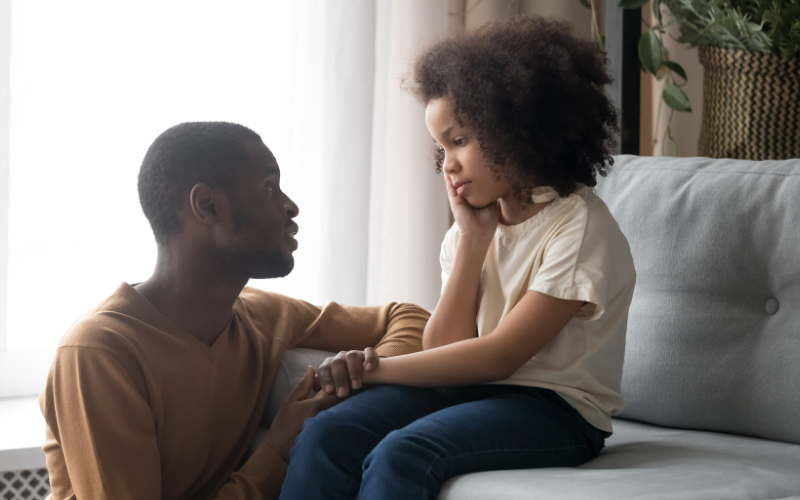It is estimated that around one in 14 children will experience the death of a parent or sibling before turning 18.
Losing a loved one is an incredibly difficult and upsetting experience for anyone. But for a child, it is one of the most traumatic and confusing things that can happen.
As a parent or guardian, it can be difficult to know how to talk to children about death. Despite how difficult it may be, it is important to address the death and hold open and honest conversations about it in the following days, weeks and months.
Whether you’re finding yourself avoiding the subject, or struggling to find the right words to prepare your child for a funeral, the tips below will help you through the process.
Read on to find out how to talk to children about death in a healthy and supportive way.
Be truthful and use realistic words
When talking to children about death, you should avoid talking down to them or using euphemisms.
Tell them the truth about what has happened immediately. Hiding the reason for your tears will not help them in the long run. Being open and honest with them can teach them how to mourn.
Some people find it easier to use phrases like ‘passed away,’ ‘went to sleep’ or ‘lost’ to describe death. Even though it may be more difficult, research has shown that using realistic terms like ‘dead’ and ‘death’ help the grieving process.
Use children’s books about death
You can use children’s books about death to help guide the conversation. These accessible books use simple, age-appropriate language to answer common questions that younger children may have about death.
These books don’t sugarcoat or downplay how difficult the experience is. They reassure children that death is part of the cycle of life, and it’s completely normal to feel sad about it.
It can be hard for parents or guardians to know what to say to children dealing with death, but these books can help you guide the conversation in a healthy way.
Be flexible in your approach
Childhood grief can be unpredictable in how it manifests. No matter how you approach the subject, your child will definitely be upset, and also possibly angry or confused.
Be prepared for any reaction, and stay flexible in your approach. Accept and validate their emotions, and give them some time or space to process the initial trauma if they need or want it.
If your child is struggling to cope with the news, gauge what they can handle and share information in smaller doses to avoid overwhelming them.
Prepare them for the funeral service
For a child who hasn’t ever been in a funeral home or attended a funeral service, this can feel scary and uncomfortable.
Demystify the process before the day so they know what to expect. Tell your child what they will see, what will happen, and who will be there.
If it is a memorial service, describe to your child where the body is: has the body already been buried or cremated, or is the body in a closed coffin? It may seem like an unnecessary detail to pass on, but it will help your child better understand and process what is happening.
Share happy memories with each other
You shouldn’t be afraid to talk about happy memories of the deceased with your child.
Sharing stories and talking about special memories can help both of you to find closure. Look at old photographs together, or listen to the favourite music of the deceased.
Sharing in this process together will allow both of you to come to terms with the loss, and will encourage you to be open with each other.
Be vulnerable
Don’t hide your own grief from your child. Children need to understand that their feelings of sadness are natural and that it is healthy to cry and feel sad after the death of someone close to them.
Similarly, be comfortable admitting that you don’t know the answer to everything. A grieving child will have a lot of questions, and it is helpful to be honest when you don’t have the answer.
Keep communication channels open
Grief is not a straightforward process, and everyone handles it differently. Some children may not want to talk about it much, and others may need to discuss their feelings often.
Let your child grieve in their own way. If they don’t want to talk about it, don’t force the subject on them.
Whatever their grieving process, make sure your child knows that you are available at any time to talk through how they’re feeling. Check-in on them often to see how they are coping.
Don’t be afraid to laugh again
The death of a peer or family member is devastating, and laughter is likely the last thing on your mind. But it is worth remembering that laughter can be a great healing tool for many.
In time, reminisce with your child about funny memories and laugh together. You should emphasize to your child that just because they have died, it doesn’t mean you will be upset forever.
There is no time limit to grief, and everyone will be ready to laugh again at different times. Just convey that when they are ready, it is normal to laugh again and it is nothing to feel guilty about.
The importance of knowing how to talk to children about death
The most important thing to remember is that no two people deal with grief in the same way.
This guide will help you know how to talk to children about death, but you should always be ready to change your approach depending on how your child is coping.
Children First Canada is committed to raising awareness about the issues affecting children and taking real action to build a better future for all young people.
We invite you to join the conversation and do your part to help give young people a voice.

